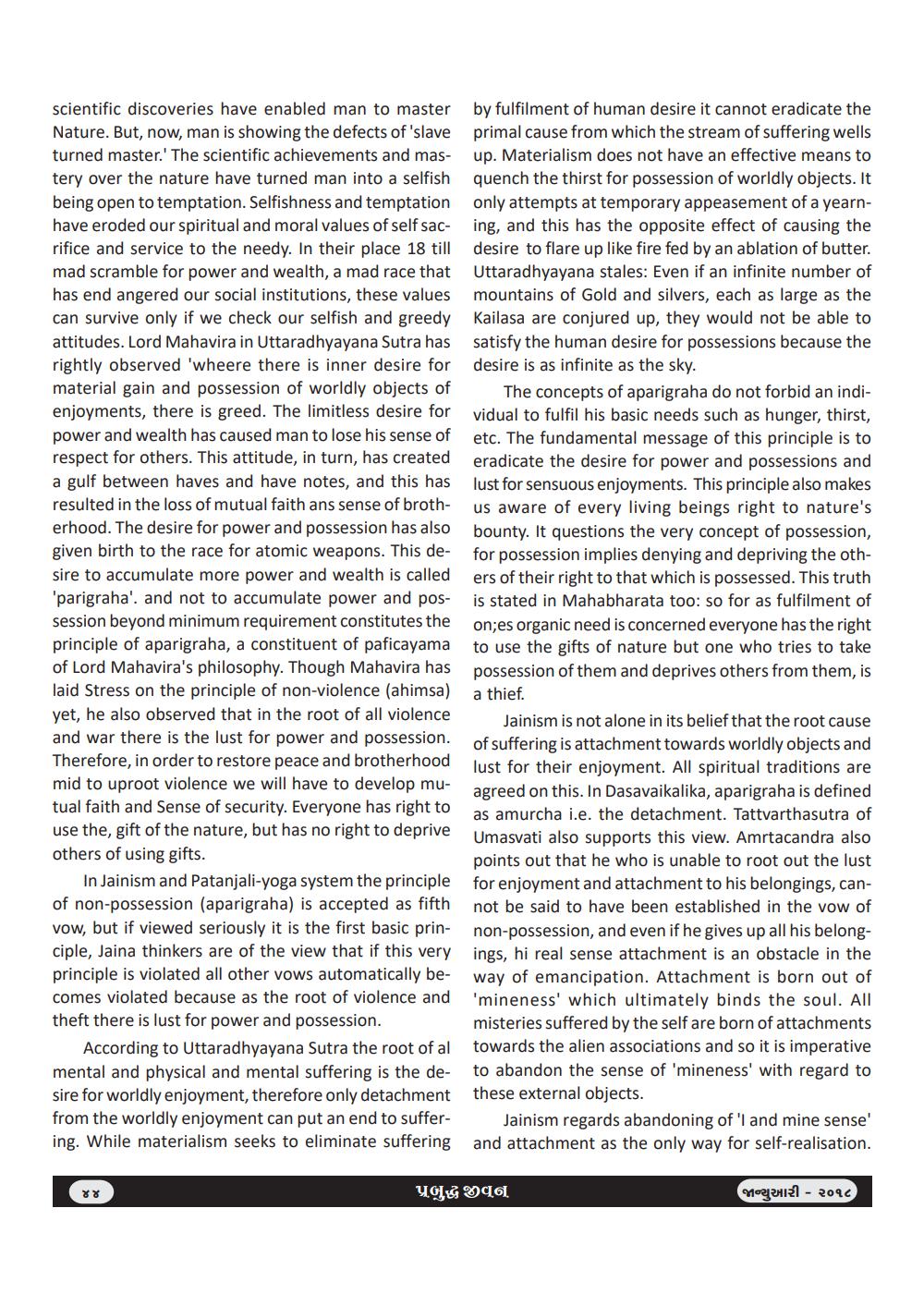________________
scientific discoveries have enabled man to master Nature. But, now, man is showing the defects of 'slave turned master.' The scientific achievements and mastery over the nature have turned man into a selfish being open to temptation. Selfishness and temptation have eroded our spiritual and moral values of self sacrifice and service to the needy. In their place 18 till mad scramble for power and wealth, a mad race that has end angered our social institutions, these values can survive only if we check our selfish and greedy attitudes. Lord Mahavira in Uttaradhyayana Sutra has rightly observed 'wheere there is inner desire for material gain and possession of worldly objects of enjoyments, there is greed. The limitless desire for power and wealth has caused man to lose his sense of respect for others. This attitude, in turn, has created a gulf between haves and have notes, and this has resulted in the loss of mutual faith ans sense of brotherhood. The desire for power and possession has also given birth to the race for atomic weapons. This desire to accumulate more power and wealth is called 'parigraha'. and not to accumulate power and possession beyond minimum requirement constitutes the principle of aparigraha, a constituent of paficayama of Lord Mahavira's philosophy. Though Mahavira has laid Stress on the principle of non-violence (ahimsa) yet, he also observed that in the root of all violence and war there is the lust for power and possession. Therefore, in order to restore peace and brotherhood mid to uproot violence we will have to develop mutual faith and Sense of security. Everyone has right to use the, gift of the nature, but has no right to deprive others of using gifts.
In Jainism and Patanjali-yoga system the principle of non-possession (aparigraha) is accepted as fifth vow, but if viewed seriously it is the first basic principle, Jaina thinkers are of the view that if this very principle is violated all other vows automatically becomes violated because as the root of violence and theft there is lust for power and possession.
According to Uttaradhyayana Sutra the root of al mental and physical and mental suffering is the desire for worldly enjoyment, therefore only detachment from the worldly enjoyment can put an end to suffering. While materialism seeks to eliminate suffering
88
by fulfilment of human desire it cannot eradicate the primal cause from which the stream of suffering wells up. Materialism does not have an effective means to quench the thirst for possession of worldly objects. It only attempts at temporary appeasement of a yearning, and this has the opposite effect of causing the desire to flare up like fire fed by an ablation of butter. Uttaradhyayana stales: Even if an infinite number of mountains of Gold and silvers, each as large as the Kailasa are conjured up, they would not be able to satisfy the human desire for possessions because the desire is as infinite as the sky.
The concepts of aparigraha do not forbid an individual to fulfil his basic needs such as hunger, thirst, etc. The fundamental message of this principle is to eradicate the desire for power and possessions and lust for sensuous enjoyments. This principle also makes us aware of every living beings right to nature's bounty. It questions the very concept of possession, for possession implies denying and depriving the others of their right to that which is possessed. This truth is stated in Mahabharata too: so for as fulfilment of on;es organic need is concerned everyone has the right to use the gifts of nature but one who tries to take possession of them and deprives others from them, is
Jainism is not alone in its belief that the root cause
of suffering is attachment towards worldly objects and lust for their enjoyment. All spiritual traditions are agreed on this. In Dasavaikalika, aparigraha is defined as amurcha i.e. the detachment. Tattvarthasutra of Umasvati also supports this view. Amrtacandra also points out that he who is unable to root out the lust for enjoyment and attachment to his belongings, cannot be said to have been established in the vow of non-possession, and even if he gives up all his belongings, hi real sense attachment is an obstacle in the way of emancipation. Attachment is born out of 'mineness' which ultimately binds the soul. All misteries suffered by the self are born of attachments towards the alien associations and so it is imperative to abandon the sense of 'mineness' with regard to these external objects.
Jainism regards abandoning of 'I and mine sense' and attachment as the only way for self-realisation.
જાન્યુઆરી - ૨૦૧૮
પ્રબુદ્ધજીવન




